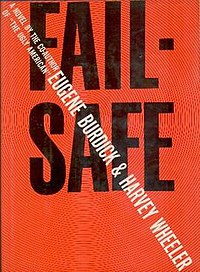When I was in high school I had this
eccentric English teacher who tried to teach us kids language arts by
having us read pop novels. I don't know what's become of Mr. Hollis,
but almost four decades after having taken his class I'm giving him a
shout-out. He taught me how to write a good essay (a skill which
served me all the way through graduate school and seminary) and when I had
successfully completed an assignment ahead of my classmates, he
furtively slipped me a beat-up copy of the then-banned The Catcher
in the Rye like he was handing
off a bag of pot. I owe the guy.
But,
as usual, I digress.
One of
the books Mr. Hollis had his students read was the Cold War suspense
novel Fail Safe. It
was about a cataclysmic computer glitch which causes a squadron of
B-52 bombers to proceed on a mission to drop nuclear warheads on the
Soviet Union. All attempts to recall the bombers fail. The US Air
Force must join efforts with the Russians to shoot down their own
aircraft. Unfortunately—spoiler alert here if you've never read the
book or seen the movie—one bomber gets through and nukes Moscow. In
order to prevent an all-out nuclear holocaust which will mean the end
of life on earth, the president of the United States makes a deal
with the Soviet premier. The president orders an American bomber to
nuke New York City. The sacrifice is necessary to prove to the
Russians that the Moscow bombing was a mistake and that the Americans
really wanted peace. The book gave me nightmares.
I
thought about Fail Safe this
week—not just because of the renewed tensions between the US and
Russia which fill our newscasts—but because of the gospel lesson in
the Revised Common Lectionary this week. (John 3:1-17)
“For God so loved the world
that he gave his only Son, so that everyone who believes in him may
not perish but may have eternal life.” (John
3:16)
The
idea of a grizzly death on the cross is horrifying if we only think
of it as a way to appease an angry God for the offense of human sin.
But such is, I think, a misreading of the text. God isn't some kind
of cosmic child-abuser. No. In John's gospel it's very clear that
Jesus and God are one. The holiness and love of God is made present
in this frail human being. Frail and prone to bleeding, pain, and
death as we all are.
The
sacrifice is necessary to show God's love, because we can't believe
anyone's claims of good intentions unless they share in our
suffering. And this sacrifice, if we look at it in light of God's
presence in our humanness, makes our pain holy. It also changes who
we are. It has the power to convince us that we are not victims of an
angry God and that our misfortunes are not signs of divine
retribution. Rather, in pain or glory, we are part of the family of
God. And not by our own choosing, either, but by God's. Such
knowledge has to change who we are.
If
Jesus is willing to enter into our mess, shouldn't we, the Church,
his body here on earth, be willing to enter into the pain of our
brothers and sisters?
This
Lent, I'm focusing on repentance. I'd like to see the Church repent
of desiring comfort and institutional survival over passion and
mission to the hurting. Remember: Lent is a time to reach out to the
poor, to enter into their sorrow as Christ entered into the sorrow of
humanity.
I
pray this will be part of your discipline, too, Dear Reader. May you
have a blessed Lenten season. Again, feel free to drop me a comment
and tell me what you like or don't like about this blog—or just say
“Hello.” That would be okay, too,
And, of course, you can also sign my
petition. The Body and Blood of Christ was given for EVERYONE for the
forgiveness of sins, so let's do a little sharing, shall we? Just
click here.

No comments:
Post a Comment